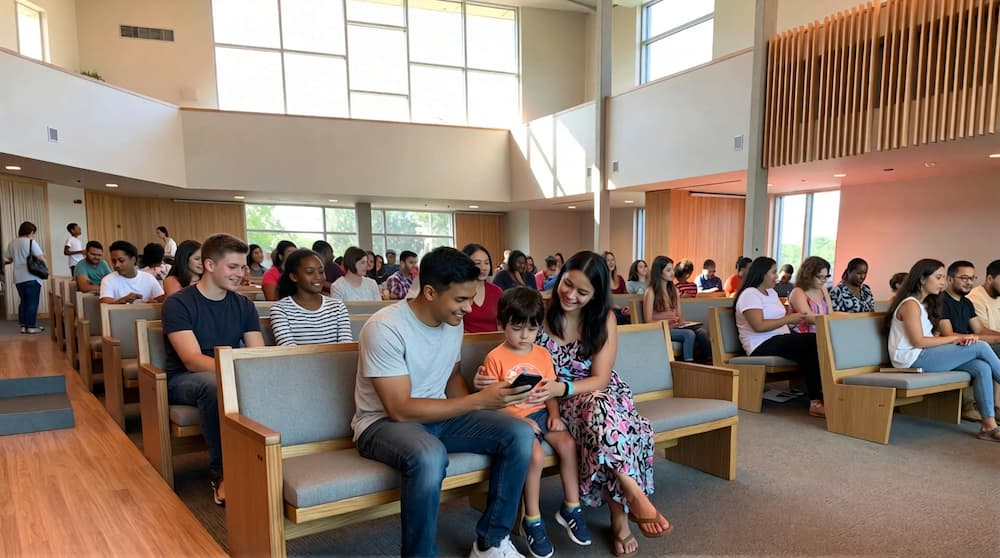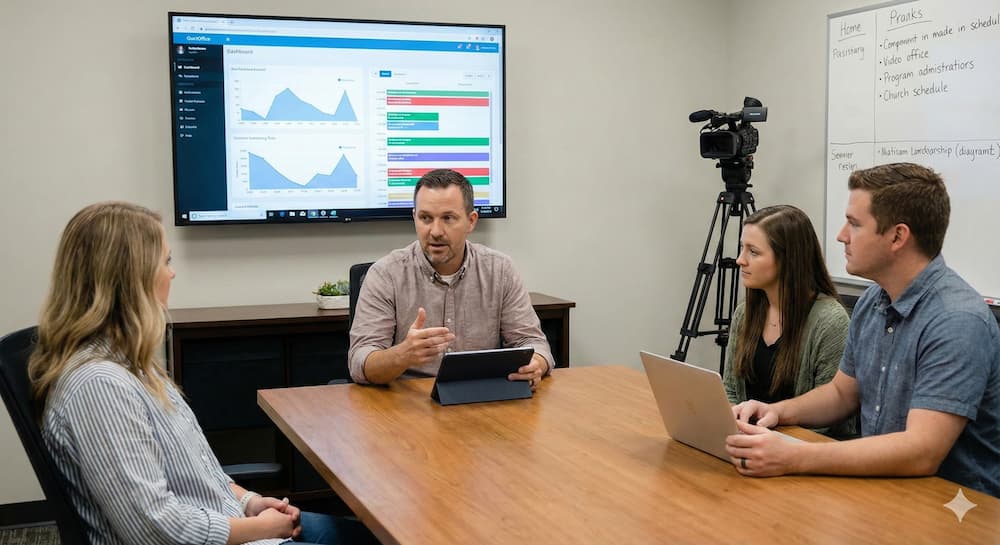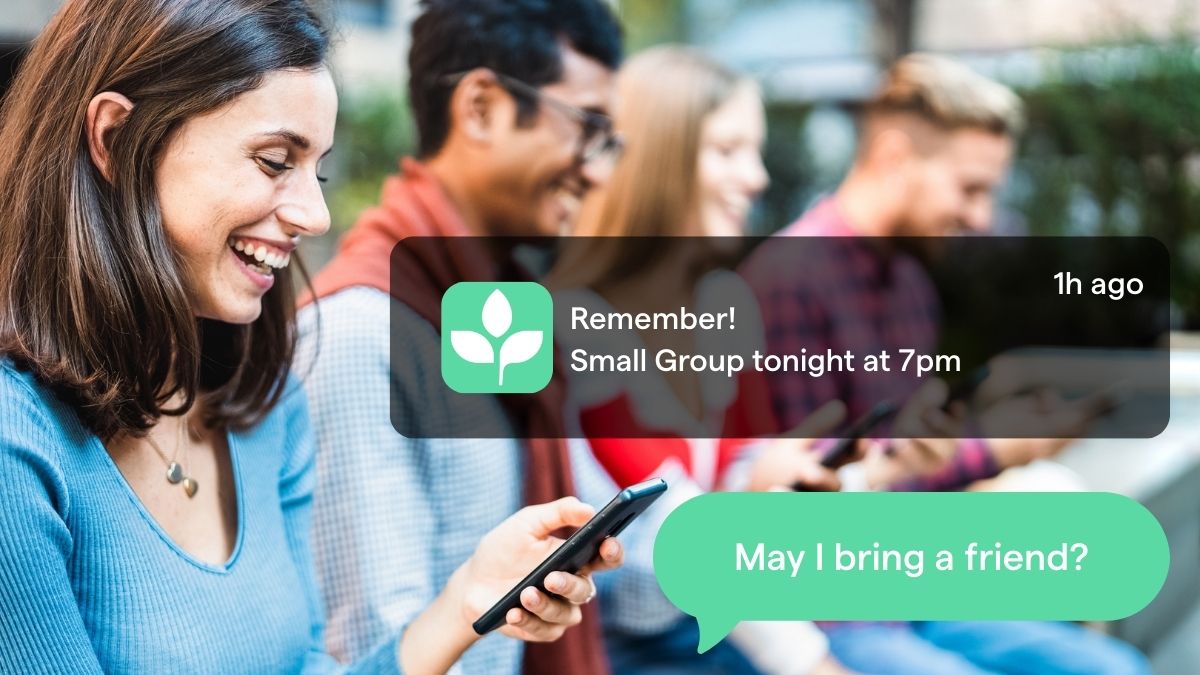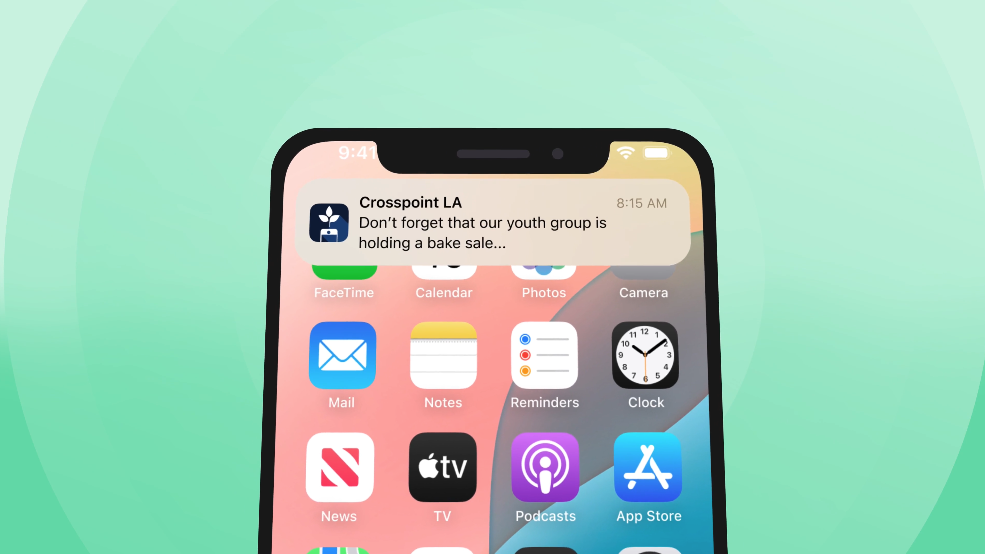The Benefits of Online Giving: According to AI
Does AI have a place in the church? Just as with all technology, we must use discernment and wisdom, and seek ways to redeem it in useful and positive ways.

Artificial Intelligence has come a long way. By scanning a few of your existing photos, AI can now recreate extremely realistic photos that are often indistinguishable from the real thing. AI video creation is now emerging quickly, meaning that you can create realistic “deep fake” videos of people doing activities or saying things that they didn’t actually do or say.
What once was too glitchy now seems much more real, and what once was too costly to create is available to anyone with a smartphone. And this is still just the beginning of this innovative and emerging technology.
While there are many reasons to be concerned about this technology, including the obvious opportunities for abuse and fraud, there are also many reasons to be excited. Just as with all technology, we must use discernment and wisdom, and seek ways to redeem it in useful and positive ways.
AI Technology That Benefits Humanity
Recently the OpenAI project released a public test of their ChatGPT product. OpenAI is a research and development nonprofit that exists to develop AI technology in a way that benefits humanity. ChatGPT is a feature that lets you chat directly with an AI program and utilize it for information, research, or even to create content.
OpenAI describes it this way: “ChatGPT interacts in a conversational way. The dialogue format makes it possible for ChatGPT to answer follow-up questions, admit its mistakes, challenge incorrect premises, and reject inappropriate requests.”
This is ground-breaking technology. Never before has an AI interface been this intuitive. Currently, this system is available publicly for anyone to use for free, as OpenAI wants real-world use as they continue to develop and improve upon it.
As I played around with ChatGPT to see what it could do, I quickly realized it is incredibly good at creating original content. So naturally, I asked ChatGPT to write a blog post about online giving for churches. Within seconds this is what it spit out, word for word:
Online giving has become an increasingly popular and convenient way for churches to receive donations from their members and supporters. With the rise of smartphones and mobile technology, it is now easier than ever for people to make donations from anywhere, at any time.
One of the key benefits of online giving for churches is increased efficiency. Traditional methods of giving, such as cash and checks, can be time-consuming and labor-intensive to process. In contrast, online giving platforms allow for quick and easy donations, which can be automatically processed and deposited into the church's account. This frees up time and resources for church leaders to focus on other important tasks.
In addition, online giving can also increase the accuracy and security of donations. With traditional methods, there is a higher risk of errors and fraud. Online giving platforms, on the other hand, offer secure payment processing and detailed tracking and reporting, which can help churches ensure that their donations are processed accurately and securely.
Another benefit of online giving is the ability to reach a wider audience. Many people today prefer to make donations online, and by offering this option, churches can appeal to a broader range of potential donors. This can also help churches to attract younger members who may not have previously considered giving to the church.
Overall, online giving is a convenient and effective way for churches to receive donations. It offers increased efficiency, accuracy, and security, and can help churches reach a wider audience of donors. If your church is not already offering online giving, it may be worth considering implementing this option.
The future of online giving for churches looks bright, with many exciting developments and innovations on the horizon.
One trend that we are likely to see in the coming years is the continued growth of mobile giving. As smartphones and mobile technology become more prevalent, it is becoming increasingly convenient for people to make donations from anywhere, at any time. This means that churches will need to ensure that their online giving platforms are mobile-friendly and easy to use on a variety of devices.
Another trend that we are likely to see is the rise of new payment technologies, such as contactless payments and digital wallets. These technologies allow for even faster and more convenient donations, and could become increasingly popular among churchgoers.
In addition, we are likely to see more churches adopting a multi-channel approach to online giving, with a focus on integrating online donations with other forms of giving, such as text-to-give and kiosk giving. This will allow churches to offer a range of options to suit the preferences of their members and supporters.
Overall, the future of online giving for churches looks bright, with many exciting developments and innovations on the horizon. By staying up-to-date with these trends and incorporating them into their online giving strategies, churches can continue to effectively engage with their members and supporters and support their important work.
That’s completely unedited, word for word created by artificial intelligence.
Needless to say, I just fired the entire marketing team at Tithely and will replace them with AI robots.
Just kidding (for now).
What About AI and Churches?
While I wouldn’t rely on AI to create all of your content, I do think there’s something here for churches to explore. We all know most churches are understaffed and under-resourced. Projects like starting a blog or coming up with social media content, can be time consuming and possibly not even something you have the talent for. What would it look like if AI could do even half the work for you by giving you a good starting point?
As Christians, we should be cautious and discerning, but we also shouldn’t live in fear. We should embrace new technologies and explore their redeeming qualities as a tool to further the Gospel.
If you’re interested in using technology to make your life a little easier–and to reach more people with the message of Jesus–you’ll want to check out Tithe.ly. We offer an entire suite of affordable products for churches (a church app, website builder, email/texting platform, and more) that can make engaging with your church family simple and effective.
If you’re really out of the box, you might consider using AI to help you get started on quality content…and then Tithe.ly to help you deploy that content to who it matters (your church members, visitors, and the unchurched).
To learn more about Tithe.ly, click here.
Sign Up for Product Updates
Artificial Intelligence has come a long way. By scanning a few of your existing photos, AI can now recreate extremely realistic photos that are often indistinguishable from the real thing. AI video creation is now emerging quickly, meaning that you can create realistic “deep fake” videos of people doing activities or saying things that they didn’t actually do or say.
What once was too glitchy now seems much more real, and what once was too costly to create is available to anyone with a smartphone. And this is still just the beginning of this innovative and emerging technology.
While there are many reasons to be concerned about this technology, including the obvious opportunities for abuse and fraud, there are also many reasons to be excited. Just as with all technology, we must use discernment and wisdom, and seek ways to redeem it in useful and positive ways.
AI Technology That Benefits Humanity
Recently the OpenAI project released a public test of their ChatGPT product. OpenAI is a research and development nonprofit that exists to develop AI technology in a way that benefits humanity. ChatGPT is a feature that lets you chat directly with an AI program and utilize it for information, research, or even to create content.
OpenAI describes it this way: “ChatGPT interacts in a conversational way. The dialogue format makes it possible for ChatGPT to answer follow-up questions, admit its mistakes, challenge incorrect premises, and reject inappropriate requests.”
This is ground-breaking technology. Never before has an AI interface been this intuitive. Currently, this system is available publicly for anyone to use for free, as OpenAI wants real-world use as they continue to develop and improve upon it.
As I played around with ChatGPT to see what it could do, I quickly realized it is incredibly good at creating original content. So naturally, I asked ChatGPT to write a blog post about online giving for churches. Within seconds this is what it spit out, word for word:
Online giving has become an increasingly popular and convenient way for churches to receive donations from their members and supporters. With the rise of smartphones and mobile technology, it is now easier than ever for people to make donations from anywhere, at any time.
One of the key benefits of online giving for churches is increased efficiency. Traditional methods of giving, such as cash and checks, can be time-consuming and labor-intensive to process. In contrast, online giving platforms allow for quick and easy donations, which can be automatically processed and deposited into the church's account. This frees up time and resources for church leaders to focus on other important tasks.
In addition, online giving can also increase the accuracy and security of donations. With traditional methods, there is a higher risk of errors and fraud. Online giving platforms, on the other hand, offer secure payment processing and detailed tracking and reporting, which can help churches ensure that their donations are processed accurately and securely.
Another benefit of online giving is the ability to reach a wider audience. Many people today prefer to make donations online, and by offering this option, churches can appeal to a broader range of potential donors. This can also help churches to attract younger members who may not have previously considered giving to the church.
Overall, online giving is a convenient and effective way for churches to receive donations. It offers increased efficiency, accuracy, and security, and can help churches reach a wider audience of donors. If your church is not already offering online giving, it may be worth considering implementing this option.
The future of online giving for churches looks bright, with many exciting developments and innovations on the horizon.
One trend that we are likely to see in the coming years is the continued growth of mobile giving. As smartphones and mobile technology become more prevalent, it is becoming increasingly convenient for people to make donations from anywhere, at any time. This means that churches will need to ensure that their online giving platforms are mobile-friendly and easy to use on a variety of devices.
Another trend that we are likely to see is the rise of new payment technologies, such as contactless payments and digital wallets. These technologies allow for even faster and more convenient donations, and could become increasingly popular among churchgoers.
In addition, we are likely to see more churches adopting a multi-channel approach to online giving, with a focus on integrating online donations with other forms of giving, such as text-to-give and kiosk giving. This will allow churches to offer a range of options to suit the preferences of their members and supporters.
Overall, the future of online giving for churches looks bright, with many exciting developments and innovations on the horizon. By staying up-to-date with these trends and incorporating them into their online giving strategies, churches can continue to effectively engage with their members and supporters and support their important work.
That’s completely unedited, word for word created by artificial intelligence.
Needless to say, I just fired the entire marketing team at Tithely and will replace them with AI robots.
Just kidding (for now).
What About AI and Churches?
While I wouldn’t rely on AI to create all of your content, I do think there’s something here for churches to explore. We all know most churches are understaffed and under-resourced. Projects like starting a blog or coming up with social media content, can be time consuming and possibly not even something you have the talent for. What would it look like if AI could do even half the work for you by giving you a good starting point?
As Christians, we should be cautious and discerning, but we also shouldn’t live in fear. We should embrace new technologies and explore their redeeming qualities as a tool to further the Gospel.
If you’re interested in using technology to make your life a little easier–and to reach more people with the message of Jesus–you’ll want to check out Tithe.ly. We offer an entire suite of affordable products for churches (a church app, website builder, email/texting platform, and more) that can make engaging with your church family simple and effective.
If you’re really out of the box, you might consider using AI to help you get started on quality content…and then Tithe.ly to help you deploy that content to who it matters (your church members, visitors, and the unchurched).
To learn more about Tithe.ly, click here.
podcast transcript
Artificial Intelligence has come a long way. By scanning a few of your existing photos, AI can now recreate extremely realistic photos that are often indistinguishable from the real thing. AI video creation is now emerging quickly, meaning that you can create realistic “deep fake” videos of people doing activities or saying things that they didn’t actually do or say.
What once was too glitchy now seems much more real, and what once was too costly to create is available to anyone with a smartphone. And this is still just the beginning of this innovative and emerging technology.
While there are many reasons to be concerned about this technology, including the obvious opportunities for abuse and fraud, there are also many reasons to be excited. Just as with all technology, we must use discernment and wisdom, and seek ways to redeem it in useful and positive ways.
AI Technology That Benefits Humanity
Recently the OpenAI project released a public test of their ChatGPT product. OpenAI is a research and development nonprofit that exists to develop AI technology in a way that benefits humanity. ChatGPT is a feature that lets you chat directly with an AI program and utilize it for information, research, or even to create content.
OpenAI describes it this way: “ChatGPT interacts in a conversational way. The dialogue format makes it possible for ChatGPT to answer follow-up questions, admit its mistakes, challenge incorrect premises, and reject inappropriate requests.”
This is ground-breaking technology. Never before has an AI interface been this intuitive. Currently, this system is available publicly for anyone to use for free, as OpenAI wants real-world use as they continue to develop and improve upon it.
As I played around with ChatGPT to see what it could do, I quickly realized it is incredibly good at creating original content. So naturally, I asked ChatGPT to write a blog post about online giving for churches. Within seconds this is what it spit out, word for word:
Online giving has become an increasingly popular and convenient way for churches to receive donations from their members and supporters. With the rise of smartphones and mobile technology, it is now easier than ever for people to make donations from anywhere, at any time.
One of the key benefits of online giving for churches is increased efficiency. Traditional methods of giving, such as cash and checks, can be time-consuming and labor-intensive to process. In contrast, online giving platforms allow for quick and easy donations, which can be automatically processed and deposited into the church's account. This frees up time and resources for church leaders to focus on other important tasks.
In addition, online giving can also increase the accuracy and security of donations. With traditional methods, there is a higher risk of errors and fraud. Online giving platforms, on the other hand, offer secure payment processing and detailed tracking and reporting, which can help churches ensure that their donations are processed accurately and securely.
Another benefit of online giving is the ability to reach a wider audience. Many people today prefer to make donations online, and by offering this option, churches can appeal to a broader range of potential donors. This can also help churches to attract younger members who may not have previously considered giving to the church.
Overall, online giving is a convenient and effective way for churches to receive donations. It offers increased efficiency, accuracy, and security, and can help churches reach a wider audience of donors. If your church is not already offering online giving, it may be worth considering implementing this option.
The future of online giving for churches looks bright, with many exciting developments and innovations on the horizon.
One trend that we are likely to see in the coming years is the continued growth of mobile giving. As smartphones and mobile technology become more prevalent, it is becoming increasingly convenient for people to make donations from anywhere, at any time. This means that churches will need to ensure that their online giving platforms are mobile-friendly and easy to use on a variety of devices.
Another trend that we are likely to see is the rise of new payment technologies, such as contactless payments and digital wallets. These technologies allow for even faster and more convenient donations, and could become increasingly popular among churchgoers.
In addition, we are likely to see more churches adopting a multi-channel approach to online giving, with a focus on integrating online donations with other forms of giving, such as text-to-give and kiosk giving. This will allow churches to offer a range of options to suit the preferences of their members and supporters.
Overall, the future of online giving for churches looks bright, with many exciting developments and innovations on the horizon. By staying up-to-date with these trends and incorporating them into their online giving strategies, churches can continue to effectively engage with their members and supporters and support their important work.
That’s completely unedited, word for word created by artificial intelligence.
Needless to say, I just fired the entire marketing team at Tithely and will replace them with AI robots.
Just kidding (for now).
What About AI and Churches?
While I wouldn’t rely on AI to create all of your content, I do think there’s something here for churches to explore. We all know most churches are understaffed and under-resourced. Projects like starting a blog or coming up with social media content, can be time consuming and possibly not even something you have the talent for. What would it look like if AI could do even half the work for you by giving you a good starting point?
As Christians, we should be cautious and discerning, but we also shouldn’t live in fear. We should embrace new technologies and explore their redeeming qualities as a tool to further the Gospel.
If you’re interested in using technology to make your life a little easier–and to reach more people with the message of Jesus–you’ll want to check out Tithe.ly. We offer an entire suite of affordable products for churches (a church app, website builder, email/texting platform, and more) that can make engaging with your church family simple and effective.
If you’re really out of the box, you might consider using AI to help you get started on quality content…and then Tithe.ly to help you deploy that content to who it matters (your church members, visitors, and the unchurched).
To learn more about Tithe.ly, click here.
VIDEO transcript
Artificial Intelligence has come a long way. By scanning a few of your existing photos, AI can now recreate extremely realistic photos that are often indistinguishable from the real thing. AI video creation is now emerging quickly, meaning that you can create realistic “deep fake” videos of people doing activities or saying things that they didn’t actually do or say.
What once was too glitchy now seems much more real, and what once was too costly to create is available to anyone with a smartphone. And this is still just the beginning of this innovative and emerging technology.
While there are many reasons to be concerned about this technology, including the obvious opportunities for abuse and fraud, there are also many reasons to be excited. Just as with all technology, we must use discernment and wisdom, and seek ways to redeem it in useful and positive ways.
AI Technology That Benefits Humanity
Recently the OpenAI project released a public test of their ChatGPT product. OpenAI is a research and development nonprofit that exists to develop AI technology in a way that benefits humanity. ChatGPT is a feature that lets you chat directly with an AI program and utilize it for information, research, or even to create content.
OpenAI describes it this way: “ChatGPT interacts in a conversational way. The dialogue format makes it possible for ChatGPT to answer follow-up questions, admit its mistakes, challenge incorrect premises, and reject inappropriate requests.”
This is ground-breaking technology. Never before has an AI interface been this intuitive. Currently, this system is available publicly for anyone to use for free, as OpenAI wants real-world use as they continue to develop and improve upon it.
As I played around with ChatGPT to see what it could do, I quickly realized it is incredibly good at creating original content. So naturally, I asked ChatGPT to write a blog post about online giving for churches. Within seconds this is what it spit out, word for word:
Online giving has become an increasingly popular and convenient way for churches to receive donations from their members and supporters. With the rise of smartphones and mobile technology, it is now easier than ever for people to make donations from anywhere, at any time.
One of the key benefits of online giving for churches is increased efficiency. Traditional methods of giving, such as cash and checks, can be time-consuming and labor-intensive to process. In contrast, online giving platforms allow for quick and easy donations, which can be automatically processed and deposited into the church's account. This frees up time and resources for church leaders to focus on other important tasks.
In addition, online giving can also increase the accuracy and security of donations. With traditional methods, there is a higher risk of errors and fraud. Online giving platforms, on the other hand, offer secure payment processing and detailed tracking and reporting, which can help churches ensure that their donations are processed accurately and securely.
Another benefit of online giving is the ability to reach a wider audience. Many people today prefer to make donations online, and by offering this option, churches can appeal to a broader range of potential donors. This can also help churches to attract younger members who may not have previously considered giving to the church.
Overall, online giving is a convenient and effective way for churches to receive donations. It offers increased efficiency, accuracy, and security, and can help churches reach a wider audience of donors. If your church is not already offering online giving, it may be worth considering implementing this option.
The future of online giving for churches looks bright, with many exciting developments and innovations on the horizon.
One trend that we are likely to see in the coming years is the continued growth of mobile giving. As smartphones and mobile technology become more prevalent, it is becoming increasingly convenient for people to make donations from anywhere, at any time. This means that churches will need to ensure that their online giving platforms are mobile-friendly and easy to use on a variety of devices.
Another trend that we are likely to see is the rise of new payment technologies, such as contactless payments and digital wallets. These technologies allow for even faster and more convenient donations, and could become increasingly popular among churchgoers.
In addition, we are likely to see more churches adopting a multi-channel approach to online giving, with a focus on integrating online donations with other forms of giving, such as text-to-give and kiosk giving. This will allow churches to offer a range of options to suit the preferences of their members and supporters.
Overall, the future of online giving for churches looks bright, with many exciting developments and innovations on the horizon. By staying up-to-date with these trends and incorporating them into their online giving strategies, churches can continue to effectively engage with their members and supporters and support their important work.
That’s completely unedited, word for word created by artificial intelligence.
Needless to say, I just fired the entire marketing team at Tithely and will replace them with AI robots.
Just kidding (for now).
What About AI and Churches?
While I wouldn’t rely on AI to create all of your content, I do think there’s something here for churches to explore. We all know most churches are understaffed and under-resourced. Projects like starting a blog or coming up with social media content, can be time consuming and possibly not even something you have the talent for. What would it look like if AI could do even half the work for you by giving you a good starting point?
As Christians, we should be cautious and discerning, but we also shouldn’t live in fear. We should embrace new technologies and explore their redeeming qualities as a tool to further the Gospel.
If you’re interested in using technology to make your life a little easier–and to reach more people with the message of Jesus–you’ll want to check out Tithe.ly. We offer an entire suite of affordable products for churches (a church app, website builder, email/texting platform, and more) that can make engaging with your church family simple and effective.
If you’re really out of the box, you might consider using AI to help you get started on quality content…and then Tithe.ly to help you deploy that content to who it matters (your church members, visitors, and the unchurched).
To learn more about Tithe.ly, click here.




























